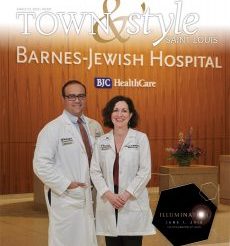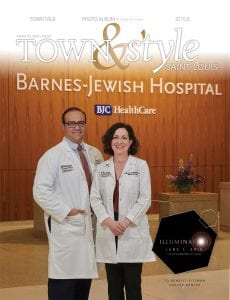Funds for Innovation: Illumination Gala | Town&Style

Funds for Innovation: Illumination Gala
Every year, nearly 10,000 newly diagnosed cancer patients walk through the doors of the Alvin J. Siteman Cancer Center at Barnes-Jewish Hospital and Washington University School of Medicine. It is often the beginning of a long and difficult journey, but researchers, doctors and staff ensure it is one that no one has to walk alone. The center is a national leader in cancer treatment, prevention, education and community outreach.
Each patient’s experience with cancer is unique, and Siteman director Dr. Timothy J. Eberlein says the center is working on breakthroughs that will make treatment of the disease equally personal. “When you have a more targeted treatment, the effectiveness is better, and there are fewer side effects,” he says, noting that Siteman was one of the first cancer centers in the country to study CAR-T cell therapy. It uses a patient’s own T cells to stimulate the immune system to identify and destroy cancer cells. Researchers also have had success treating the recurrence of leukemia in children with an immunotherapy that uses NK cells. “Immunotherapies use our bodies’ natural mechanisms, and as we better understand how to control these responses to focus on cancer, the more effective treatments will become,” Eberlein says. “It’s a very exciting time for the field.”
One innovation currently being tested at the center is personalized breast cancer vaccination. Eberlein explains that doctors do a genomic analysis of the tumor to tailor the treatments to an individual. “A vaccine created to treat your cancer will only work for you,” he says. “Its design is based on the tumor’s specific mutations, and it stimulates the immune system to recognize the cancer but not normal cells.”
 He explains that this is better for patients than chemotherapy, which also kills noncancerous cells. Researchers are using breast cancer as the paradigm to best understand when and how these vaccinations can be administered, but Eberlein says they are hopeful it will be effective with other types as well, such as head and neck cancer.
He explains that this is better for patients than chemotherapy, which also kills noncancerous cells. Researchers are using breast cancer as the paradigm to best understand when and how these vaccinations can be administered, but Eberlein says they are hopeful it will be effective with other types as well, such as head and neck cancer.
There have been other advancements to help treat breast cancer, according to Eberlein. An injectable fluorescent dye that stains cancerous cells makes it easier for doctors to determine where the disease is located. Eberlein also says new types of radiation therapy have made lumpectomy recovery easier. “In the past, patients would need to have radiation every weekday for six weeks,” he explains. “Now, we are able to complete radiation therapy in two to three weeks.”
The best hope for cancer is prevention, and Eberlein says Siteman invests in these efforts through community outreach. The center has launched a program in North County aimed at fighting health care disparities and reducing the number of area women who present with late-stage breast cancer. It combines aggressive education programs, mammograms and other screenings, and community partnerships with churches and organizations like The Breakfast Club, a support group for women with the disease. “It’s important that we are able to get out into the community,” Eberlein says. “We’ve had some great opportunities to make real progress in education and prevention, but there is still a long way to go.”
Siteman is one of the largest cancer centers in the country, and to continue doing its important work, Eberlein says it cannot rely on government grants alone. He notes that outside funds are vital to the research process, making it possible to develop and test new ways to treat and identify cancer and to support patients. “We use the money from donations and fundraisers to invest in innovative ideas,” he explains. “The experience we gain with these new treatments allows us to provide better data to the National Institutes of Health and National Cancer Institute, which in turn gets us bigger grants. Without community support, the fight against cancer is delayed.”
One of the major fundraising events that benefit Siteman Cancer Center is the Foundation for Barnes-Jewish Hospital’s Illumination Gala. Since 2007, the event has raised nearly $26 million to support research funds, including the Cancer Frontier Fund, which was created by Bill and Amy Koman to help researchers at Siteman continue to make innovative breakthroughs in cancer treatment and prevention. This year, the gala will be held June 1 at The Ritz-Carlton. The evening will feature a special appearance by Jeff Goldblum and his jazz band, The Mildred Snitzer Orchestra.
Even with the gala’s added Hollywood star power, for Eberlein, the MVPs are those who work behind the scenes to make the event a success, like this year’s chairs, Carl Bouckaert, Sue McCollum and Suzanne Sitherwood. “Illumination is a terrific demonstration of just how wonderful St. Louis is,” Eberlein says. “It’s remarkable how the community continues to stand behind the doctors, researchers and patients at Siteman.”
The Illumination Gala benefits cancer research at the Alvin J. Siteman Cancer Center at Barnes-Jewish Hospital and Washington University. The event is June 1 at The Ritz-Carlton. Pictured on the cover: Drs. Jose Zevallos and Katherine Weilbaecher. For sponsorship or ticket information, call 314.286.0602, email [email protected] or visit illuminationgala.org.
Cover design by Julie Streiler | Cover photo by Tim Parker Photography
Pictured at top: Drs. Jose Zevallos and Katherine Weilbaecher
Photo: Tim Parker Photography
